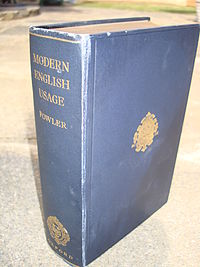


07/02/2016
Where there’s a "will" … there’s someone who prefers "shall," and vice versa.
Many years ago I wrote the following thing:
Anyone who writes for the public knows the following rule: You can say anything you like about the President, the Governor or the Mayor. You can pour scorn on religion, science, capitalism, socialism, motherhood or the flag. You can spit at the PLO, the IRA, the Chinese Communist Party, the EU, the UN, NOW, the AFL/CIO, ACT/UP, Rainbow/PUSH, or even, if you are exceptionally brave, the teachers' unions.Nothing much will happen to you. Your house will not be fire-bombed, your car will not be vandalized, your children will not be taunted in the schoolyard.
But if you leave a dangling participle, split an infinitive, or attribute an H.L. Mencken quote to Ambrose Bierce — then, get busy stocking up the fallout shelter and set the kids to filling sandbags. Nothing gets people worked up like a slip in grammar or usage.

It’s all still true. I casually observed in the June 24th Radio Derb that the chorus refrain in "Rule Britannia" — "Britons never will be slaves" — sounds wrong to English ears. The lyricist James Thomson was a Scot, who wrote "will" where an Englishman more naturally prefers "shall."
And that opened up the email floodgates. The emailers were around two to one hostile. Fowler’s Modern English Usage was much quoted against me, this bit for example:
The English of the English differs from the English of those who are not English. The idiom of the former may be roughly summarized thus: that in the first person shall is the "plain" auxiliary and will the "coloured" [i.e. with a color of intention], and in the second and third persons it is the other way about.Uh-huh. You can litigate this kind of thing indefinitely. My 1965 edition of Fowler gives six and a half full columns — say two thousand words — to "shall" and "will." Here are a few more of those words.
The Scottish, Irish, etc. idiom, especially as followed on the American continent, has made formidable inroads; and insistence on the rules … illustrated in this article may before long have to be classed as insular pedantry. This is regrettable.Yes it is; but the world moves on, and so shall I.
No, wait … so will I? Ah, the heck with it.
England’s flyover people. The June 23rd Brexit vote was of course big news. I was curious to see how my home town voted, so I looked up the local newspaper.
NORTHAMPTON: Leave (61,454, 58 per cent), Remain (43,805, 42 per cent).That’s my people. The provincial English, though — what in the U.S.A. we call "flyover people" — don’t work up much excitement about politics. It’s sport that gets the juices flowing.
Here they were seven weeks earlier, thousands of them in the streets of the town to celebrate the town soccer team ending the season at the top of their league.
The crowds started gathering before 3pm in the Market Square and as the numbers grew towards 4pm a carnival atmosphere developed with deafening singing and chanting from the fans young and old."Cobblers" is the team nickname; Northampton’s an old shoe manufacturing town.
Dane Freeman said: "From being almost out of it in October to actually come at the top by a wide gap is just brilliant. It’s almost like a fairy tale." [Thousands of fans cheer on Cobblers' champions as bus parade passes through Northampton; Northampton Chronicle & Echo, May 8th 2016.]
So: Brexit, Shmexit — Go Cobblers!
Cuck Lit.? In a conversation with Gavin McInnes while waiting for a subway train, I learned a new word: "cuckmercial." That’s one of those TV commercials — one of the many, many — in which a clueless doofus male is set right by a smart, confident woman.
Browsing the Twitter feed later, I see that this is now a hashtag.
I'll admit I wasn’t crazy about the "cuck-" prefix when it got started, but I’m seeing the light. Let’s try to get it up to dictionary-inclusion level. So far we have cuckservatives and cuckmercials. What else can we cuck-shame?
Well, there have been TV sitcoms along the same lines as those cuckmercials, going back to at least The Dick van Dyke Show. Cuck-coms!
I spotted the word "Cuckstians" in some comment thread, referring to Christians whose faith leads them out into missionary endeavors among people — preferably African — who accept their aid packages and medicines while laughing at the missionaries' naive idealism when their backs are turned. Fair enough, I suppose, but I doubt "Cuckstians" will catch on: too hard to pronounce.

How about Cuck Lit.? Vanity Fair comes to mind, and Gone With the Wind. The memory’s dim, but I think The Wife of Bath’s Tale gets in there, too. And recalling the plot of Seeing Calvin Coolidge in a Dream, I think I may have contributed to the Cuck Lit. genre myself.
However, I wouldn’t advise going into a bookstore (supposing you can find one nowadays) and asking for the Cuck Lit. section. They'd probably just send you to the cookery books.
Oh, Shenandoah. Driving back from the American Renaissance conference at the end of May I got a speeding ticket on Interstate 81 around Pulaski, Va. It was my first speeding ticket for a dozen years.
I’m not complaining. The trooper clocked me at 86 in a 70 zone; that’s too fast. He was professional; I was polite. You do the crime, you do the time. I didn’t think I was going any faster than others on the road; but that’s no defense. It was past midnight, anyway, and there weren’t that many others on the road, so it was hard to tell. And I guess my out-of-state license plates were a provocation of some kind … But hey.
I have a suspicion, though, that I may have learned something about the political culture of Virginia, and no doubt other places.
Handing me my ticket, the trooper said: "Because you were driving over 80, I have to write it as Reckless Driving."
That didn’t really register at the time. I was tired, and embarrassed, and I just wanted to get home. I thought, but I hope did not say,whatever.

Back in New York, I filled out the Trial in Absence form and mailed it off to Pulaski County General District Court, resigned to having to pay some kind of fine when the case comes up in July.
Then the letters started to arrive. I got a slew of them, all from attorneys in the Shenandoah Valley. I guess these firms watch the posted court schedules and fire off letters accordingly. Sample:
Virginia law states the maximum penalty for a conviction for Reckless Driving is punishable by [sic] up to 12 months in jail, a 6 month license suspension, and a fine of $2,500 (rarely do judges give the maximum penalty). Defendants are found guilty if they plead guilty by letter, ignore their court date, appear in court and plead guilty, or prepay their fines. We can typically negotiate a reduction or a dismissal of your ticket.After consulting with friends who know that part of the country, I signed up with one of the firms and paid them a small fee. "Probably cheaper in the long run," my friends assured me.
Again, I’m not complaining. I am, though, trying to imagine how these laws get passed. A stitch-up between bar associations, state lawmakers, and trooper unions? No, surely not. That can’t be it. Unthinkable!
Al-Walid the Cheap. I got more grumbling from readers after my June 24th all-Brexit podcast.
Working over the globalism v. nationalism business, I recycled my argument that mid-20th-century despotic nationalism was bad not because nationalism is bad, but because despotism is bad. I made an analogy with monarchy:
Despotic monarchy is a bad thing, too: think of John Lackland or Ivan the Terrible.Readers: "John who?"
Sorry. I've nursed a lifelong neurosis of the most minor sort over the fact that the only English monarch to bear my name is universally considered one of the worst.
Well, almost universally. There is inevitably a revisionist school: historians have to distinguish themselves from the pack somehow. "He has received less than his due for his abilities as a brilliant commander in land warfare, an imaginative pioneer of naval defence and an inventive and energetic administrator" — Michael St John Parker.

OK, but I was educated in the traditional view:
King John was not a good man —Thus neuroticized, I’m reluctant to allow John his kingship. In any case, I like those medieval sobriquets. Who, having heard it, can forget that Charlemagne was the offspring of Pippin the Short and Bertha Bigfoot? You can almost see them … Well, never mind.He had his little ways.
And sometimes no one spoke to him
For days and days and days.
(Although, looking up that link and doing some more checking, I have learned that Caliph al-Walid the Inadequate got his sobriquet — al-Naqis in Arabic — not on account of any personal shortcomings, but because, according to the chronicler, "he cut back the increase of ten dirhams in the people’s stipends which [his predecessor] had decreed for them." Good to know.)
Is hating Russia an Anglo-Saxon value? A commenter at Steve Sailer’s blog opines that:
Outside of Poland, hating Russia is mostly an Anglo-Saxon value, not Western. Germans don’t trust Russia, but they are fascinated with Russian culture and tend to like Russians on a gut level. The French, Italians and Austrians are fairly positive about Russia, they just dislike rich new Russians flaunting their wealth. I don’t know whether the Spanish give Russia much thought at all. Brexit is a disaster for Poland in the sense that Poland will no longer have a strong ally inside the EU who shares the Polish dislike of Russia and willingness to support an anti-Russian Ukraine.Having been raised solidly lower-middle-class Anglo-Saxon in the middle of England in the middle of the last century, I can confidently list the nations disliked most by the English common people at that time, in order by degree of hostility.
The following list is a bit of a "tadpole," mind, with most of the negative emotion concentrated at the top.
These things are to some degree time-dependent. Possibly there was anti-Russian feeling among the English at the time of the Crimean War; I couldn’t say.
Of course there were positives along with the negatives. The Germans were efficient and made terrific cameras; the Irish were eloquently witty and good to have on your side in a fight; Americans were generous; blacks had a great sense of rhythm; etc. Even the French, people would grudgingly allow, knew how to make a woman look good. My list there is based solely on the negativities.
And overlaying it all was the old English sense that foreigners are comical. Some categories of foreigner — Australians, for instance — were just comical, with no negativity at all; with, in fact, no other attributes of either parity. They existed solely to make us laugh.
Foreigners had their own negative feelings about the English, of course. While my fellow-countrymen were telling each other that the French smell bad, GIs back in the U.S.A. were telling theirs the same thing about the English, probably correctly.
Things that really matter. Another June, another birthday. Would the kids remember to call? Mom and Dad have a strict and binding agreement not to prompt them.
They both called, bless them.
Better than that, in fact. My son, after wishing me a happy birthday, said: "I bought you a present, Dad."
Me: "Hey, thanks! You going to mail it or bring it?" (He lives on the other side of the country but will be home for a couple of weeks in July.)

He: "Neither. Go upstairs to my room. [I went.] My clothes closet … second shelf from top … about eye level. Reach towards the back. You'll feel some tissue paper …"
It was a beautiful, rather expensive, silk tie. (Shown here.) Junior, thinking ahead, had purchased it last time he was home, six months ago, and secreted it in his closet for my birthday.
At such moments all the troubles and anxiety of child-raising, all the storm and stress, blow away like chaff in the wind, leaving in plain sight the core things, the things that really matter.
Happy birthday? Oh yeah.
Math Corner.
(1) Mean, median, mode. A thing that makes mathematicians and statisticians grind their teeth is the confusion, common among journalists, between average and median.
Average of N numbers: Add 'em up and divide by N. The result is the average, also known as the mean.The average and the median can be way different. Here are five numbers: 1, 2, 3, 4, 1000000. The average (add 'em up and divide by five) is 200002. The median (middle number when listed in order) is 3.Median of N numbers: List them in order, smallest to biggest. If N is odd, the median is the middle number in the list; if N is even, the median is the average of the middle two.
Similarly, the median net worth of U.S. households in 2013 was $81,400. Half of households had net worth less than that, half had more. The average net worth, however, was $528,400 — "pulled up" way above the median by the billionaires. There aren’t many billionaires; but a billion is a lot of net worth.
A statistic you don’t hear much about is the mode. That’s the number that shows up most often in your list — the "most popular" number. If no number shows up more than once, there’s no mode: every number is equally "popular." If there’s a tie for "most popular," the list is multimodal.
Mode made a rare showing in the news this month at the Daily Caller website.
Census Data: Most Common Age For Whites Is 56, 9 For HispanicsIf you're still confused, here’s a math help website with explanations and examples.The most common age of white American residents is 56 years old, 27 years old for Asian Americans, 25 years old for black Americans, and nine years old for Hispanic Americans, according to June 2016 census data.
 (2) The Riemann Hypothesis: Update. The great embarrassment of my life as an author is that my best-selling book — it still brings me a nice royalty check every six months — is
(2) The Riemann Hypothesis: Update. The great embarrassment of my life as an author is that my best-selling book — it still brings me a nice royalty check every six months — is
about math. Hey, we can’t all be Marcel Proust.
I get regular emails asking me whether there’s been any progress in proving (or disproving) the Riemann Hypothesis (RH), which was the subject of my 2003 book.
To be perfectly honest I haven’t made any effort to keep up. I got interested in the topic around year 2000; read everything I could find; went to some conferences; wrote a book; then moved on to fresh woods and pastures new.
I do know that the RH hasn’t yet been proved (or disproved). It would have been a major news story.
And I did just this month acquire a copy of Henryk Iwaniec’s Lectures on the Riemann Zeta Function. I didn’t have space in my book for more than a nod of acknowledgment to Henryk (half of whose mail, as I noted, comes to him addressed "Henry K. Iwaniec"), but he’s a leading expert on the zeta function, which the RH is about.
This book contains 29 chapters of lecture notes from material the author presented to graduate students at Rutgers in the fall of 2012. Half of the chapters supply background to the RH; the other half follow up on a key 1974 result of Norman Levinson’s.
It’s higher math, not to be ventured on lightly; but if you finished Prime Obsession, some of the earlier background stuff will be familiar, and those later results shouldn’t be totally impenetrable.
I’m anyway obliged to Prof. Iwaniec for reminding me of one of my favorite mathematical terms of art: the mollifier. You need some grounding in Functional Analysis to really grasp the thing, but the Info List does a decent job of explaining.
John Derbyshire writes an incredible amount on all sorts of subjects for all kinds of outlets. (This no longer includes National Review, whose editors had some kind of tantrum and fired him. ) He is the author of We Are Doomed: Reclaiming Conservative Pessimism and several other books. He’s had two books published by VDARE.com: FROM THE DISSIDENT RIGHT (also available in Kindle) and From the Dissident Right II: Essays 2013. His writings are archived at JohnDerbyshire.com.
Readers who wish to donate (tax deductible) funds specifically earmarked for John Derbyshire’s writings at VDARE.com can do so here.